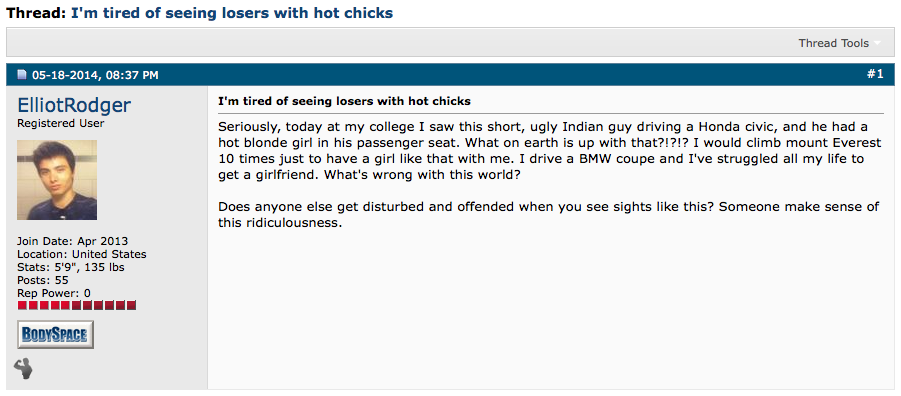Trigger Warning: This article contains descriptions of murder, shootings, and violence against women, as well as the misogynistic words of an alleged mass murderer.
“I am polite. I am the ultimate gentleman, and yet, you girls never give me a chance. I don’t know why.”
In a YouTube video entitled “Why do girls hate me so much?”, Elliot Rodger expresses dismay at his romantic life. “I’m 22 years old, and I’ve never had a girlfriend. I’m still a virgin. I’ve never had the pleasure of having sex with a girl, sleeping with a girl, kissing a girl, I’ve never even held a girl’s hand.” Though this video may seem like the insignificant musings of a lonely and confused young man, it is actually an integral part of a twisted tragedy. A massacre on the campus of University of California-Santa Barbara left seven dead and seven more injured. The frequency of mass shootings is increasing, with five already in the past five months. Every time a shooting like this receives media attention, people often point the finger at the mistreatment of mental illness and a lack of gun control. This situation is no exception. Elliot Rodger was diagnosed with “highly functional Asperger’s Syndrome” according to his parents. Media sources, as well as people, are pointing to this as a cause for his violence. This view contributes to the stigmatization of mental illness in this country, and misrepresents their connection with violence.
A fact sheet by the University of Washington School of Social Work dispels many of the myths relating to mental illness and violence. First of all, a majority of violent people do not have a mental illness. The public exaggerates the connection between mental illness and violence, which does exist, but the connection is very small. In fact, people with mental illness are far more likely to be victims of mass violence than perpetrators. The stigmatization of mental illness leads sufferers to internalize the societal views, and this may bar them from seeking treatment for their symptoms. If these mass shootings were the result of mental illness alone, it would make sense that the demographics for perpetrators are equal across gender and race, yet this is not the case. Mass murderers are typically white males in the upper class. Mental illness cannot be blamed exclusively for these crimes because mentally ill women are not often the perpetrators.
Elliot Rodger’s crime was not the direct result of psychosis; it was the result of a carefully cultivated hatred for women wrought out of a life of loneliness. His videos reveal a deep-seeded objectification of women, specifically white, blonde women. He states in “Why do girls hate me so much?”, “I see so many beautiful blonde-haired girls walking around everywhere. In your revealing shorts, cascading blonde hair, your pretty faces. I want one for a girlfriend.” Elliot Rodgers, though half-asian and half-white, idolized whiteness, and was actually racist. Some of his hatred was towards men of color who were able to date the “beautiful blonde women” whom Rodger lusted.

“Full Asian men are disgustingly ugly and white girls would never go for you. You’re just butthurt that you were born as an asian piece of s***, so you lash out by linking these fake pictures. You even admit that you wish you were half white. You’ll never be half-white and you’ll never fulfill your dream of marrying a white woman. I suggest you jump off a bridge.”
Rodger displayed an internalized racism and an elevation of white women onto a pedestal. He felt offended when “lesser, undeserving” men—non-white, unattractive in his eyes, or poor—were able to date these white blonde girls while he remained unexperienced and alone.
Elliot Rodger’s insecurity was also directed at his lack of sexual experience. He felt inadequate as a 22-year old virgin, and he faulted women for this. In his last video, “Retribution,” he lays out his plan,”I’m going to enter the hottest sorority house of UCSB and I will slaughter every single spoilt, stuck-up, blonde s*** that I see inside there.” He continues to express his rage, “All those girls that I’ve desired so much, they would have all rejected me and looked down on me as an inferior man if I ever made a sexual advance towards them.” In a chilling end, he reveals his alpha male goal, “I’ll take great pleasure in slaughtering all of you. You will finally see that I am, in truth, the superior one. The true alpha male.” Rodger’s hatred for women was fostered by his activity on anti-pickup artist websites and with Men’s Rights Activists. There, commonly anti-female rhetoric fostered a resentment of women’s choice because those choices did not involve him.
![[Image Attribute: PolicyMic]](https://united4sc.org/wp-content/uploads/sites/46/2019/07/8781fcfd5658c3cb57e7c85a0c9127cd.png)
In response to this misogyny and the common excuse of “not all men are like that” when women speak out about misogynistic behavior, the hashtag “yesallwomen” has become trending on Twitter. Women and feminist activists are sharing stories about how they face harassment, violence, and misogyny on a regular basis from men, proving that it is not an individual issue, it is culturally pervasive. Violence against women is not limited to this incident.
![Pervasive violence against women [Image Attribute: Think Progress]](https://united4sc.org/wp-content/uploads/sites/46/2019/07/by_the_numbers-09-1-638x908.png)
[Image Attribute: Think Progress]
